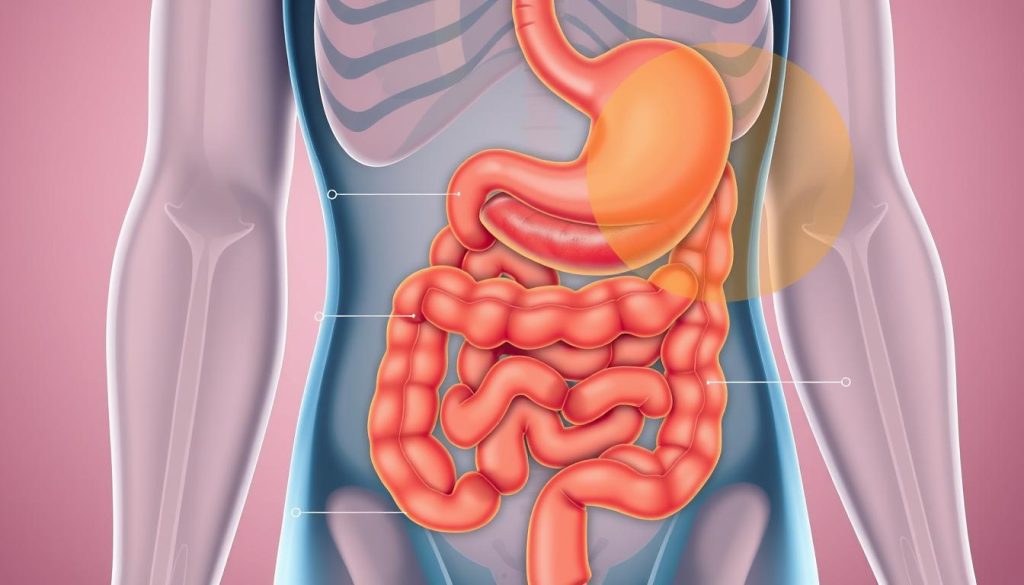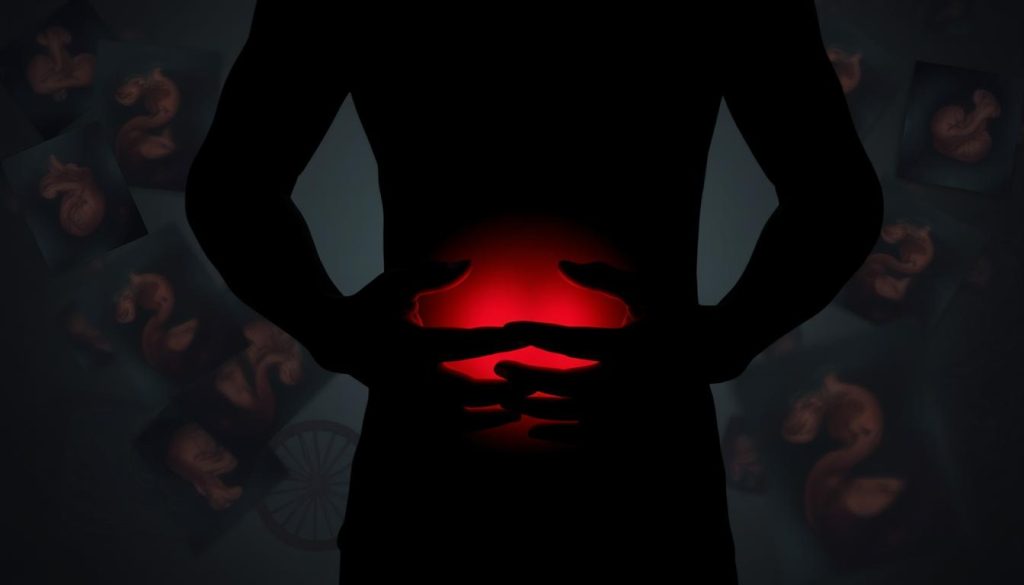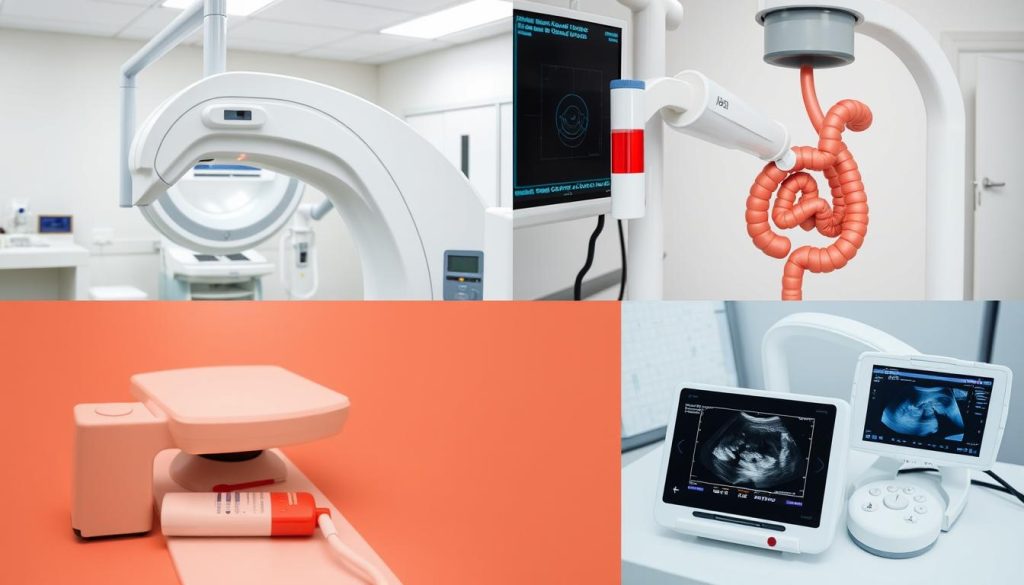Spotting cancer symptoms early can save lives. Knowing what to look for helps you take control of your health. This guide will cover important signs of cancer that need your attention. Changes like unexplained weight loss or persistent pain might mean you need to see a doctor. Finding cancer early often means better treatment options. By watching for cancer symptoms, you help protect your health.
Let’s look at the key warning signs that shouldn’t be ignored. Knowing these signs can help catch cancer early, when it’s most treatable.
Understanding Common Cancer Symptoms and Warning Signs
Cancer awareness begins with knowing the signs. Spotting warning signs early is key for catching cancer early. Let’s look at common symptoms that might mean cancer and when to see a doctor.
Physical Changes That Warrant Attention
Some physical changes could be early cancer signs. These include unexpected weight loss, constant tiredness, or skin changes. Keep an eye on your body for any lasting unusual changes.
Distinguishing Between Normal and Concerning Symptoms
Not every symptom is cancer. Knowing the difference is important. Normal symptoms usually go away fast, but cancer symptoms keep coming back or get worse. If you’re not sure, talk to a doctor.
- Normal: Occasional fatigue that improves with rest
- Concerning: Persistent exhaustion that doesn’t improve with sleep
- Normal: Minor bruising from known injuries
- Concerning: Unexplained bruising or bleeding
Timeframes for Seeking Medical Evaluation
Getting cancer diagnosed early can make a big difference. If symptoms last more than two weeks, see your doctor. For serious symptoms like unexplained bleeding or severe pain, go to the hospital right away.
Knowing about cancer signs doesn’t mean you have it. It helps you take care of your health and get medical help when you need it.
Unexplained Weight Loss and Appetite Changes
Sudden, unexplained weight loss and changes in appetite are signs of cancer you shouldn’t ignore. These symptoms can be early signs of different cancers. They need attention from a healthcare professional.
Weight loss of 10 pounds or more without trying is a big deal. It can happen because cancer cells use up the body’s energy. Or because the body processes nutrients differently. Changes in appetite often go with weight loss. You might feel full quickly or lose interest in your favorite foods.
Not all unexplained weight loss is from cancer, but it’s important to watch for it. Seek medical advice for early detection. Some cancers linked to unexplained weight loss include:
- Pancreatic cancer
- Stomach cancer
- Lung cancer
- Esophageal cancer
- Ovarian cancer
If you lose weight or appetite changes last more than a few weeks, see your doctor. They can run tests to find out why. This helps rule out serious conditions.
| Symptom | Possible Causes | When to Seek Help |
|---|---|---|
| Unexplained weight loss | Cancer, thyroid issues, depression | 10+ pounds lost without trying |
| Loss of appetite | Cancer, medication side effects, stress | Persists for 2+ weeks |
| Feeling full quickly | Stomach cancer, ovarian cancer | Occurs consistently for several meals |
Early detection of cancer symptoms can lead to better treatment outcomes. Be aware of changes in your body. Don’t hesitate to talk to your healthcare provider about your concerns.
Persistent Fatigue and Weakness
Feeling tired is normal, but constant fatigue could be a sign of cancer. It’s important to know the difference between regular tiredness and the kind caused by cancer. This knowledge helps in catching health problems early.
Normal Tiredness vs. Cancer-Related Fatigue
Regular tiredness goes away with rest. But, cancer-related fatigue keeps coming back, even after you sleep. This exhaustion can make everyday tasks hard. If you’re always tired for weeks, see a doctor.
Effects on Daily Life
Cancer-related fatigue makes simple tasks hard. Going to the grocery store or climbing stairs can be tough. This tiredness can also make you less productive and withdraw from social activities.
Symptoms to Watch
Look out for these signs:
- Unexplained weight loss
- Loss of appetite
- Difficulty concentrating
- Pale skin
- Shortness of breath
If you have these symptoms with constant fatigue, get checked by a doctor. Finding cancer early can lead to better treatment. Remember, fatigue can also be from other, less serious issues. A doctor can figure out what’s causing it and guide you next.
Unusual Bleeding or Bruising Patterns
It’s important to notice unusual bleeding or bruising early. These signs might not always mean cancer, but they’re worth checking out. They could lead to a quick doctor’s visit.

Seeing blood in your nose, urine, or stool, or getting bruises easily are red flags. These could be signs of blood cancers or other serious issues. Keep track of how often and how bad these happen.
If you see any of these, see your doctor right away:
- Frequent nosebleeds without a reason
- Blood in urine, making it pink, red, or cola-colored
- Bright red blood in stool or dark, tarry stools
- Bruises appearing without known injuries
- Bleeding gums or unusual vaginal bleeding
Spotting cancer early can make a big difference. These symptoms might not always mean cancer, but they need a doctor’s check-up. Your doctor can run tests to find out what’s going on and suggest treatment if needed.
| Bleeding/Bruising Pattern | Possible Cancer Type | Other Possible Causes |
|---|---|---|
| Nosebleeds | Leukemia, Nasal cancer | Dry air, High blood pressure |
| Blood in urine | Bladder, Kidney cancer | Urinary tract infection, Kidney stones |
| Blood in stool | Colorectal cancer | Hemorrhoids, Inflammatory bowel disease |
| Easy bruising | Leukemia | Vitamin deficiency, Blood thinners |
Early detection is key in fighting cancer. Keep an eye out for any unusual body changes. And don’t wait to get medical advice when you need it.
Changes in Skin Appearance and Texture
Skin changes can be early signs of cancer. Regular self-checks and cancer screening help with early detection. Let’s explore key skin changes to watch for.
Mole Changes and ABCDE Rule
The ABCDE rule helps spot suspicious moles:
- A – Asymmetry
- B – Border irregularity
- C – Color variations
- D – Diameter larger than 6mm
- E – Evolving size, shape, or color
If a mole shows these traits, consult a doctor for skin cancer screening.
Skin Color and Texture Alterations
Watch for these skin changes:
- Unexplained redness or darkening
- Rough or scaly patches
- Itching or tenderness
- Sores that don’t heal
New Growth Patterns to Watch
Be alert for:
- Firm, red nodules
- Flat, flesh-colored lesions
- Pearly or waxy bumps
- New growths on existing moles
These new growths warrant medical attention. Early detection through regular skin checks can lead to better outcomes. If you notice any concerning changes, don’t hesitate to seek medical advice.
| Skin Change | Potential Concern | Action |
|---|---|---|
| New mole with ABCDE traits | Melanoma | Immediate doctor visit |
| Rough, scaly patch | Squamous cell carcinoma | Dermatologist evaluation |
| Pearly bump | Basal cell carcinoma | Skin biopsy |
Digestive System Changes and Complications
It’s important to watch for changes in your digestive system. These changes could mean you have cancer. Let’s look at some signs of cancer in the digestive system.

Persistent stomach pain is a warning sign. If you have pain in your stomach that doesn’t go away, see a doctor. This could mean you have pancreatic, stomach, or colorectal cancer.
Changes in how you go to the bathroom are also a warning. These can include:
- Constipation or diarrhea that lasts for more than a few weeks
- Narrow or pencil-thin stools
- Blood in the stool or rectal bleeding
- Feeling like you can’t fully empty your bowels
Having trouble swallowing is a sign of esophageal cancer. If you struggle to swallow food or liquids, or if it feels like food is stuck, don’t ignore it.
| Digestive Symptom | Possible Cancer Type | When to Seek Help |
|---|---|---|
| Persistent Abdominal Pain | Pancreatic, Stomach, Colorectal | If pain lasts more than 2 weeks |
| Changes in Bowel Habits | Colorectal | If changes persist for 3+ weeks |
| Difficulty Swallowing | Esophageal | If problem is ongoing or worsens |
Early detection is key in fighting cancer. If you notice any ongoing digestive problems, talk to your doctor. While these symptoms don’t always mean cancer, it’s better to be safe and get checked out.
Persistent Cough and Respiratory Issues
A persistent cough or breathing troubles might signal cancer early. Spotting these signs can help catch cancer sooner. Let’s look into when breathing problems need a doctor’s visit.
Duration and Character of Cough
A cough that lasts over three weeks is a worry. Notice its sound and any other symptoms. A dry, hacking cough or coughing up blood is urgent.
Associated Breathing Problems
Shortness of breath, wheezing, or chest pain with coughing are warning signs. They might point to lung cancer or other serious issues. Keep track of how these symptoms impact your daily life.
Risk Factors and Environmental Considerations
Some things raise your risk for respiratory cancers. Smoking, secondhand smoke, and working with harmful materials are big ones. Think about your surroundings and lifestyle to gauge your risk.
| Risk Factor | Impact on Cancer Risk | Preventive Action |
|---|---|---|
| Smoking | High | Quit smoking |
| Secondhand Smoke | Moderate | Avoid smoke exposure |
| Occupational Hazards | Varies | Use protective equipment |
| Air Pollution | Low to Moderate | Minimize outdoor activities on high pollution days |
If you have ongoing respiratory problems, see a doctor, even with risk factors. Catching cancer early can greatly improve treatment chances.
Unexplained Pain and Discomfort

Pain that doesn’t go away or has no clear cause can be a sign of cancer. While not all pain means cancer, it’s important to listen to your body. Persistent pain is one of the cancer symptoms that shouldn’t be ignored.
Different types of unexplained pain may include:
- Headaches that won’t quit
- Bone pain that gets worse at night
- Stomach aches that last for weeks
It’s normal to have aches now and then. But pain that sticks around or gets worse needs a doctor’s look. Keep track of when and where you feel pain. This info helps your doctor figure out what’s wrong.
Early detection of cancer often starts with noting unusual body changes. If you have pain that won’t go away, don’t wait. Talk to your doctor. They can help find out if it’s a sign of cancer or something else.
Remember, most pains aren’t cancer. But checking with a doctor can ease your mind or catch problems early. Your health is worth the time it takes to get checked out.
Changes in Bladder and Bowel Habits
Changes in how you use the bathroom can be signs of cancer. Knowing these signs helps find cancer early. Keep an eye on any changes in your body’s usual habits.
Urinary Changes to Monitor
Watch for frequent need to pee, pain when you pee, or blood in your urine. These could mean problems in your urinary system. If these signs last more than a few days, see a doctor.
Bowel Movement Alterations
Changes in stool color, shape, or consistency can be cancer signs. Look for:
- Black or tarry stools
- Blood in the stool
- Narrow, pencil-thin stools
- Persistent diarrhea or constipation
These changes might mean problems in your digestive system.
When to Seek Immediate Medical Attention
Some changes need urgent care. Get help right away if you have:
| Symptom | Possible Indication |
|---|---|
| Severe abdominal pain | Bowel obstruction |
| Inability to urinate | Prostate or bladder issues |
| Large amounts of blood in stool | Gastrointestinal bleeding |
Don’t ignore these warning signs. Finding cancer early can greatly improve treatment outcomes.
Early Detection Through Regular Cancer Screening
Cancer screening saves lives. It finds cancer early, when treatment works best. Regular check-ups help catch issues before symptoms appear. This boosts survival rates and treatment success.

Different tests screen for various cancers. Mammograms check for breast cancer. Colonoscopies look for colon cancer. Pap smears detect cervical cancer. Each test has its own schedule. Follow your doctor’s advice on when to get screened.
Early detection through screening is key to prevention. It spots changes before cancer develops. This allows for quick action. Sometimes, doctors can remove precancerous cells. Other times, they catch cancer at its earliest stage.
- Mammograms: Every 1-2 years for women 40+
- Colonoscopies: Every 10 years starting at 45
- Pap smears: Every 3 years for women 21-65
Talk to your doctor about your risk factors. Family history and lifestyle choices matter. They affect which tests you need and how often. Remember, screening is not one-size-fits-all. Your plan should fit your needs.
Don’t wait for symptoms to appear. By then, cancer may have spread. Regular screening catches problems early. It gives you the best chance at a healthy future. Make cancer screening a priority in your health routine.
Recognizing Gender-Specific Cancer Symptoms
Cancer affects everyone, but some signs are more common in certain sexes. It’s important to know these signs to catch cancer early. Let’s look at key warning signs for women and men to raise cancer awareness.
Women’s Health Warning Signs
Women should watch for body changes that could mean cancer. Look out for breast lumps, skin changes, or nipple discharge. Also, abnormal vaginal bleeding, even after menopause, is a red flag.
Persistent bloating or pelvic pain could be a sign of ovarian cancer. These symptoms need quick medical attention.
Men’s Health Red Flags
Men should be aware of testicular changes like lumps or swelling. Trouble urinating, needing to pee a lot at night, or blood in urine might mean prostate cancer. Unusual breast changes in men could be male breast cancer.
Both men and women should watch for general symptoms like unexplained weight loss, fatigue, or pain. Regular health checks and screenings are key to early detection. Knowing these signs helps us stay healthy and aware of cancer.
Age-Related Cancer Risk Factors
As we get older, our chance of getting cancer goes up. This makes it very important to know about cancer and how to prevent it. Knowing the risks can help us stay healthy.
After 50, the risk of cancer really increases. For example, most breast cancer is found in people over 62. Most colorectal cancer is found in people over 68. This doesn’t mean younger people can’t get cancer, but it shows we need to watch out more as we age.

People of different ages face different cancer risks. Here’s a look at some common cancers by age:
| Age Group | Common Cancer Types | Recommended Screenings |
|---|---|---|
| 20-39 | Melanoma, Thyroid, Testicular | Skin checks, Self-exams |
| 40-49 | Breast, Colorectal, Cervical | Mammograms, Pap smears |
| 50+ | Prostate, Lung, Colorectal | Colonoscopy, PSA test, Low-dose CT scan |
We can’t change our age, but we can prevent cancer. Eating right, exercising, and not smoking can help. Early detection through screenings is also very important for treatment.
Family History and Genetic Predisposition
Knowing your family’s health history is key to cancer awareness and prevention. Genetic factors can greatly affect your risk for certain cancers. Let’s look at how hereditary cancer syndromes, genetic testing, and prevention strategies help those at high risk.
Understanding Hereditary Cancer Syndromes
Hereditary cancer syndromes are genetic conditions that make you more likely to get specific cancers. These conditions come from genes passed down in families. For example, BRCA1 and BRCA2 mutations increase the risk of breast and ovarian cancers.
Genetic Testing Options
Genetic testing can find inherited mutations that may raise cancer risk. This process includes:
- Consultation with a genetic counselor
- Blood or saliva sample collection
- Laboratory analysis of DNA
- Results interpretation and follow-up
If you have a strong family history of cancer, talking about genetic testing with your doctor is a big step in prevention.
Prevention Strategies for High-Risk Individuals
For those at high genetic risk, there are several prevention strategies:
- Enhanced screening: More frequent or earlier cancer screenings
- Lifestyle modifications: Maintaining a healthy diet and exercise routine
- Preventive medications: Drugs that can reduce cancer risk in certain cases
- Prophylactic surgery: Removing at-risk tissue before cancer develops
Having a genetic predisposition doesn’t mean you’ll definitely get cancer. Working with healthcare professionals can help you make a plan to manage your risk and focus on prevention.
Lifestyle Factors Affecting Cancer Risk
Your daily choices greatly affect your cancer risk. It’s important to know these factors for prevention and awareness. Let’s look at key lifestyle elements that impact your health.
Smoking is a major risk for many cancers. Quitting can lower your risk and improve your health. Drinking too much alcohol can also raise your cancer risk. It’s best to drink in moderation.
Your diet and exercise are strong tools against cancer. Eating fruits, vegetables, and whole grains helps your body fight off diseases. Regular exercise keeps you healthy and boosts your immune system.
Sun exposure is often ignored but is very important. Protecting your skin from UV rays can greatly reduce skin cancer risk. Use sunscreen, wear protective clothes, and stay out of the sun during peak hours.
| Lifestyle Factor | Impact on Cancer Risk | Prevention Strategy |
|---|---|---|
| Smoking | High risk for lung, throat, and other cancers | Quit smoking, avoid secondhand smoke |
| Alcohol | Increases risk of liver, breast, and colon cancers | Limit consumption, practice moderation |
| Diet | Poor diet linked to various cancers | Eat balanced, plant-based meals |
| Physical Activity | Inactivity increases cancer risk | Exercise regularly, stay active |
| Sun Exposure | Elevates skin cancer risk | Use sunscreen, limit exposure |
By choosing wisely in your lifestyle, you can lower your cancer risk. Remember, small changes can make a big difference in your health and well-being.
When to Schedule Emergency Medical Evaluation
Knowing when to get immediate medical help is vital for catching cancer early. Some symptoms need quick attention and can’t be ignored. Spotting these warning signs early can greatly improve your health.
Critical Warning Signs
Severe pain, unexplained bleeding, or trouble breathing are urgent signs. Also, watch for sudden vision changes, high fever, or severe headaches. If you notice any, go to the emergency room right away.
Emergency Room vs. Primary Care Visits
Some cancer symptoms need emergency care, while others can be seen by your doctor. Severe symptoms go to the ER, but mild ones might wait for a doctor’s visit. Always choose caution if you’re not sure.
Documentation for Medical Appointments
Being ready for doctor visits helps you talk clearly with your healthcare team. Keep a log of your symptoms, like when they started and how long they last. This info helps doctors do tests and find problems early. Good communication leads to better diagnosis and treatment.
FAQ
Q: What are the most common early signs of cancer?
A: Early signs of cancer include unexplained weight loss and persistent fatigue. You might also notice unusual bleeding or bruising. Changes in skin appearance and a persistent cough are other signs. Unexplained pain is also a warning sign. But, these symptoms can have many causes, so seeing a doctor is key.
Q: How can I distinguish between normal tiredness and cancer-related fatigue?
A: Cancer fatigue is much worse and lasts longer than regular tiredness. It doesn’t get better with rest and affects your daily life. If you’re always tired and it’s hard to do things, talk to your doctor.
Q: What is the ABCDE rule for evaluating moles?
A: The ABCDE rule helps spot possible melanomas:
A – Asymmetry: The two halves don’t match.
B – Border: The edges are irregular or jagged.
C – Color: The mole has different colors.
D – Diameter: It’s bigger than 6mm, like a pencil eraser.
E – Evolving: It changes in size, shape, or color over time.
If your mole shows these signs, see a dermatologist right away.
Q: When should I be concerned about changes in bowel habits?
A: Be worried if bowel habits change for more than a few weeks. This includes ongoing diarrhea, constipation, or changes in stool size or color. Blood in the stool, persistent abdominal pain, or unintended weight loss with these changes need immediate medical help.
Q: How often should I get cancer screenings?
A: How often you need screenings depends on your age, gender, and risk. Generally:
– Mammograms: Every 1-2 years for women 45+
– Colonoscopies: Every 10 years starting at 45
– Pap smears: Every 3 years for women 21-65
– Prostate exams: Discuss with your doctor starting at 50 (earlier for high-risk men)
Always follow your healthcare provider’s advice based on your risk.
Q: Are there specific cancer symptoms women should watch for?
A: Yes, women should watch for:
– Breast changes (lumps, skin changes, nipple discharge)
– Abnormal vaginal bleeding or discharge
– Pelvic pain or pressure
– Bloating that persists
– Changes in skin moles
– Unexplained weight loss or gain
Any lasting or concerning changes should be checked by a healthcare professional.
Q: How does age affect cancer risk?
A: Cancer risk goes up with age. About 87% of cancer cases in the U.S. are in people 50 or older. This is because of genetic mutations and longer exposure to harmful substances. But, cancer can happen at any age, so staying healthy is important all your life.
Q: Should I consider genetic testing for cancer risk?
A: Think about genetic testing if you have:
– A strong family history of certain cancers
– Cancer diagnosed at a young age in your family
– Multiple types of cancer in close relatives
– Certain ethnic backgrounds with higher risk of specific genetic mutations
Talk to a genetic counselor or your doctor to see if testing is right for you.
Q: What lifestyle changes can help reduce cancer risk?
A: Key lifestyle changes include:
– Quitting smoking or avoiding tobacco
– Maintaining a healthy weight
– Regular physical activity
– Eating a balanced diet with fruits and vegetables
– Limiting alcohol
– Protecting your skin from too much sun
– Getting vaccinated against cancer-causing infections (like HPV)
– Attending regular cancer screenings
Q: When should I seek emergency medical evaluation for potentially cancer symptoms?
A: Seek immediate medical help for:
– Severe, unexplained pain that doesn’t go away
– Difficulty breathing or shortness of breath
– Unexplained bleeding or bruising
– Sudden changes in vision or neurological function
– High fever with other concerning symptoms
– Severe, persistent abdominal pain
If unsure, it’s always best to seek medical help right away.

















